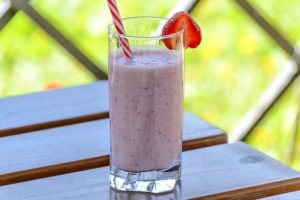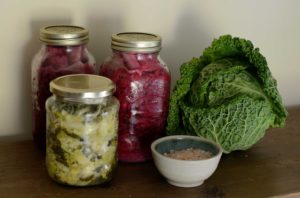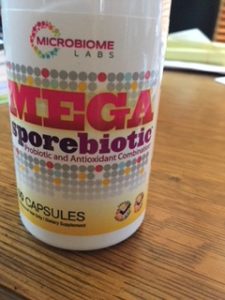Probiotics and Depression
I look back on my own health as a child and realize a lot of my own issues stemmed from the imbalance in my gut. I was a sick kid, so on lots of antibiotics. Then when I was in 6th grade I was placed on medication for my kidney health for 2 years. My health only got worse after that. Knowing now what I know, and all the health issues I had, it makes sense. My gut health was a mess and I am sure I had more bad bacteria then good. When I was older and was sick, one round of antibiotics wouldn’t even work for me any longer.
Gut health is a popular subject lately and for good reason. As Hippocrates said, “All disease begins in the Gut”. We are only now beginning to understand how true this is, for our physical and mental health.
Your gut is made up of bacteria. We need to have a balance between the “good” and “bad” bacteria. Research is indicating that having more good bacteria in our gut can impact our overall mood. Using probiotics for depression remains controversial but data is showing that this can have a positive impact on our well-being.
A study (1) done in 2016 showed that probiotic supplementation had a positive impact on those with depression who were under the age of 60. (It did not show improvement in those over 65). We need to face the fact that our brain and our gut is linked and if one is not working properly, the other is most likely not either. A small study done in 2017 showed that probiotics reduced symptoms of depression and anxiety. (2)
Probiotic’s may also be helpful for depression associated with bipolar. In a study published in the Journal of Psychiatric Research, they looked at the microbiome of those with bipolar and those without bipolar. They found that those with bipolar had significantly different microbiomes than those without bipolar. They had low levels of two strains that have been associated with overall health. (4)
Studies show that probiotics should be considered an adjuvant to standard care for depression since it may reduce oxidative stress and thus may also lead to an increase in brain derived neurotropic factor (BDNF). (5) BDNF, a protein, is found abundantly in the brain and is found in both human serum and plasma. Stress can reduce BDNF expression in the hippocampus. Recently BDNF has been shown to play a vital role in depression. This topic is still quite controversial and some research in this area differs. (6) There is a connection between low BDNF and depression but the verdict is still not in as to whether low BDNF is a contributing factor for depression. At this time, we know we need to know more about BDNF and its role in depression.
Tip: to increase BDNF add in probiotics and exercise.
What to Take/What to Eat
Don’t stress out about the specific strains in your probiotics. While we may see in the future, specific probiotic products made specifically for certain health issues such as depression, IBS, bipolar, anxiety or IBD, right now it is good to get a probiotic that contains a variety of strains. You want diversity in your gut.
While you may think you can swap out your antidepressant for a probiotic, this may not be the case. Just taking a probiotic may not be enough to bring balance to the microbiome. (and please just don’t go off your medications. See my article on medication tapering here )
Just taking a supplement is usually not enough. It can be a good start but odds are, if you have depression, there is more you must do, including finding an individualized diet that is right for your body.
The simplest way of doing this, is to slowly remove junk food categories from your diet. For instance, start by removing candy, and junk food that contains sugar such as donuts, pastries, and cookies. Swap these out for healthier options such as avocado pudding, chia seed pudding, or nut butter with dark chocolate. Then move on to another category such as salty snacks such as all the different chips and processed snacks. Try not to replace with what may seem like healthier options (for instance, while Non-GMO corn chips are a better option, they still typically contain canola oil which is a refined, oxidized oil that contributes to systemic inflammation). (depression can have inflammation as a root cause)
By removing the processed junk food from your diet, you will also be removing a bulk of GMO foods from your diet. Glyphosate, the chemical that is sprayed on GMO crops has been shown to disrupt the gut and cause inflammation. By reducing the amount in your diet, you are improving gut health and reducing inflammation, both which are implicated in depression. (3)
Eat Your Whole Food Carbs!
Don’t be afraid of the right type of carbs! It seems like everyone is lumping ALL carbs into the “bad” category. Whole food carbs are VERY important for gut health. Think of foods such as beets, potatoes, parsnips and carrots, beans and legumes (your starchy carbs) as food for the good bacteria in the gut. These good guys need food just like you do to thrive so give them what they need! This is critical-you want a wide range of good bacteria strains but you must support these strains with good food in the diet.
Probiotic Rich Foods
Adding in a variety of probiotic rich foods will be very supportive for your gut health. Any type of food sensitivity should be addressed first by working with a nutrition professional and removing these foods since these will disrupt the gut causing leaky gut syndrome.
Fermented foods will be rich in probiotics. You can look up easy recipes to make your own but there are so many fermented products on the market now, that you don’t have to do this. Look for raw fermented sauerkraut, Bubbies pickles, other fermented vegetables, raw unfiltered apple cider vinegar such as Braggs, kombucha, goat milk kefir, goat milk yogurt, kimchee, miso, tempeh. Click here for more information of fermented foods.
If fermented foods are new to you and if you have any digestive issues, go slow with these foods to allow your body time to adjust. If you begin by adding in a lot of fermented foods you may create chaos in the gut and notice signs of this bloating and gas for instance, which in the end, may cause you to think that fermented foods are bad for your body. By going slow, I mean just one strand of sauerkraut, for example, and slowly work your way up to one tablespoon per day. (you don’t need as much fermented food as you think).
Supplementation
I personally use and prefer (and recommend for many of my clients) a spore based one such as megaspore from microbiome labs. (at www.microbiomelabs.com use TFN67 to order as you need to order via a health professional).
I like and use only probiotics from this company currently because it is easy to take with you as it doesn’t require refrigeration, it has been shown in studies to reduce the amount of bad bacteria in the gut, Megaspore has been shown to reduce leaky gut by 60% in just 30 days, and they survive through the digestion process and no enteric coated capsule is needed which are just a few of the benefits.
You can mix and match to save yourself money once you start to notice an improvement in your depression. For instance, have some days with fermented foods and then days with supplementation. You may need to work up to the probiotic dose as for some it can cause at first some digestive distress. A dose of megaspore is typically 2 capsules per day and with probiotic foods, for most, 1-2 tablespoons per day of fermented veggies will suffice.
Bottom Line
If you have depression, I believe adding in probiotics in one form or another is a “must do”. If you have questions or need more support, give me a call or email me.
Sources
- https://www.ncbi.nlm.nih.gov/pubmed/27509521
- https://fhs.mcmaster.ca/main/news/news_2017/tie_between_probiotic_and_depression.html
- http://articles.mercola.com/sites/articles/archive/2017/06/22/probiotics-depression-aspx?
- https://www.medicalnewsbulletin.com/bacteria-mental-health-gut-bacteria-linked-bipolar-disorder/
- http://sciencedirect.com/science/article/pii/S0306987704004967
- https://www.nature.com/aps/journal/v32/n1/aps2010184a.html






Leave A Comment
You must be logged in to post a comment.